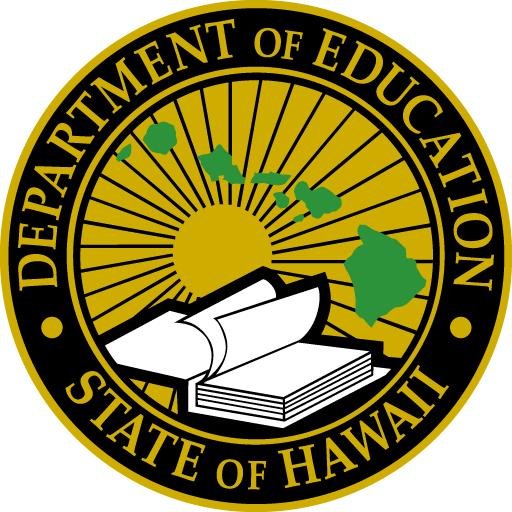E ola pono. E mālama i nā piko.
Live pono. Nurture thriving connections.
While the primary focus of health education is the development of health skills, these skills must be addressed in conjunction with functional information in the context of priority risk topics. Standards-based health education must be age and developmentally appropriate, medically accurate and provide factual information in all priority risk topics:
- Mental and emotional health
- Healthy eating and physical activity
- Personal health and wellness
- 안전(의도치 않은 부상 예방)
- 폭력 예방
- 담배 사용 예방
- 알코올 및 기타 약물 사용 예방
- Sexual health and responsibility
메모: 건강교육 in prekindergarten is aligned to the 하와이 조기 학습 및 개발 표준(HELDS).
과정 요구 사항
- 건강교육 is required in all elementary grades.
- Middle/intermediate schools must offer courses that allow all students to meet Hawaiʻi՚s health education standards and performance indicators for grades 6-8. One semester (0.5 credits; 60 hours) of health education in each middle/intermediate school grade is strongly recommended but not required.
- In high school, a one semester course (0.5 credits; 60 hours) in health education is required for graduation.
- A variety of health specialized elective courses (e.g., peer education) are available at the secondary school level.
- 중학교 진급 및 고등학교 졸업 요건은 다음을 참조하세요. 이사회 정책 105-1 학업 프로그램(PDF), Board Policy 102-9 Middle Level 교육 Promotion Policy (PDF), 그리고 이사회 정책 102-15 고등학교 졸업 요건 및 개교(PDF).
wellness guidelines for 건강교육
Comprehensive health education provides the instructional foundation that prepares students to build healthy relationships and make lifelong healthy decisions. The 웰빙 가이드라인 support quality health education grounded in Hawaiʻi.
The wellness guidelines for health education are organized around 3가지 핵심 구성 요소 that address instructional minutes, include nutrition education, and emphasize culturally relevant and ʻāina-based approaches:
- Instructional content of health education classes includes a focus on knowledge and skills that support healthy eating and is aligned with the HIDOE standards for health education.
- 건강교육 is provided to students in elementary grades at least 45 minutes per week and secondary grades at least 200 minutes per week.
- Nutrition education includes culturally relevant activities that are ʻāina-based and hands-on, such as food preparation, taste-testing, farm visits and school gardens.
Sexual 건강교육
Comprehensive sexual health education helps students understand and navigate their development and growth as they progress from childhood through puberty and adolescence. Effective, comprehensive sexual health education provides students with the age-appropriate, medically accurate content and skills to know and be able to communicate for healthy relationships, access resources and support, and make healthy decisions.
Several state laws and policies help prevent teen pregnancy and the spread of sexually transmitted infections through comprehensive sexual health education.
- 주법 (Hawaiʻi Revised Statutes (HRS) §321-11.1) establishes requirements for any state-funded sexual health education program.
- Board Policy 103-5 Sexual 건강교육 (PDF) requires the Department to implement comprehensive sexual health education.
- 학교에서 활용하는 커리큘럼에 대한 설명은 학부모/법적 보호자에게 제공되어야 하며, 어떠한 수업이 시작되기 전에 학교 웹사이트에 게시되어야 합니다.
- A student shall be excused from sexual health instruction only upon the prior written request of the student’s parent or legal guardian.
- 학생의 부모나 법적 보호자가 서면으로 요청한 경우, 학생은 징계 조치, 학업적 처벌 또는 기타 제재를 받지 않을 수 있습니다.
Parents or legal guardians can also opt-out of having their children participate in instruction related to controversial issues.
학부모 또는 법적 보호자는 학교 관리자 또는 교사에게 편지를 써서 자녀를 특정 수업이나 활동에서 제외할 수 있습니다. 그러한 편지를 받으면 학생에게 대체 학습 활동을 제공해야 합니다. 학부모 또는 법적 보호자는 수업이나 활동 전에 학교 관리자 또는 교사에게 통지할 의무가 있습니다.
Recommended instructional materials:
- FLASH (PDF)
- Get Real (PDF)
- HealthSmart (PDF)
- Pono Choices (PDF)
- Positive Prevention PLUS (PDF)
- Reducing the Risk with the Supplement (PDF)
- Rights, Respect, Responsibility (PDF)
Learn more about Sexual 건강교육 in the HIDOE (PDF)
Sexual Violence Prevention 교육
Teaching students about sexual violence prevention is essential for nurturing safe and caring schools and communities. It equips students with information and skills that promote healthy relationships and respect for others. It also helps students understand how to seek support if they or someone they know experiences sexual violence.
Prevention-oriented and developmentally-appropriate sexual violence prevention instruction to students addresses:
- bodily autonomy (e.g., body awareness and safety, consent, boundaries),
- recognizing and reporting sexual abuse, and
- accessible resources (e.g., trusted adults, community resources).
Department schools will be responsible for providing a description of the curriculum on their public-facing websites. Before the start of instruction to students, schools will notify parents and legal guardians about the upcoming instruction, how to preview the school’s materials, and the opt-out process.
A student shall be excused from sexual violence prevention instruction only upon the prior written request of the student’s parent or legal guardian. A student may not be subject to disciplinary action, academic penalty, or other sanctions if the student’s parent or legal guardian makes a written request.
Approved instructional materials:
- Elevatus Training Curriculum: Sexuality 교육 for People with Developmental Disabilities, Adapted for People with High Support Learning Needs (PDF)
- Fight Child Abuse (PDF)
- HealthSmart (PDF)
- Mad Hatter Wellness Curricula (PDF)
- NetSmartz (PDF)
- Positive Prevention PLUS, Special Populations (PDF)
- Rights, Respect, Responsibility (PDF)
- Second Step Child Protection Unit (PDF)
- The Sex Abuse Treatment Center’s Sexual Abuse Prevention Curricula (PDF)
Learn more about Sexual Violence Prevention in HIDOE.
general health education 자원
- Why 건강교육 Matters (Google Doc)
- 건강교육 Standards and Topics Overview (Google Doc)
- Learning Design for 건강
- 건강교육 Printables (Google Drive)
- 웰빙 가이드라인
- You Matter! 건강 자원
- Using School Gardens in 건강교육
- Reviewing Instructional Materials for 건강교육 (PDF)
- 2022 Hawaiʻi School 건강 Profiles – Highlights Report (PDF)
USDA 차별 금지 성명
연방 시민권법과 미국 농무부(USDA) 시민권 규정 및 정책에 따라, 이 기관은 인종, 피부색, 국적, 성별(성 정체성 및 성적 지향 포함), 장애, 연령, 이전 시민권 활동에 대한 보복이나 앙갚음을 이유로 차별하는 것이 금지됩니다.
프로그램 정보는 영어 이외의 언어로 제공될 수 있습니다. 프로그램 정보를 얻기 위해 대체 의사소통 수단(예: 점자, 대형 인쇄, 오디오테이프, 미국 수화)이 필요한 장애인은 프로그램을 관리하는 담당 주 또는 지방 기관이나 USDA TARGET 센터(202) 720-2600(음성 및 TTY)에 연락하거나 (800) 877-8339의 연방 릴레이 서비스를 통해 USDA에 연락해야 합니다.
프로그램 차별에 대한 불만을 제기하려면 불만 제기자는 USDA 프로그램 차별 불만 양식인 AD-3027 양식을 작성해야 합니다. 이 양식은 다음 온라인 사이트에서 받을 수 있습니다. https://www.usda.gov/sites/default/files/documents/USDA-OASCR%20P-Complaint-Form-0508-0002-508-11-28-17Fax2Mail.pdf, USDA 사무실에서, (866) 632-9992로 전화하거나, USDA로 편지를 써서 신고할 수 있습니다. 편지에는 불만 제기자의 이름, 주소, 전화번호, 그리고 주장된 차별적 행위에 대한 서면 설명이 포함되어야 하며, 시민권 담당 차관보(ASCR)에게 주장된 시민권 침해의 성격과 날짜를 알리기에 충분한 세부 정보가 포함되어야 합니다. 작성된 AD-3027 양식 또는 편지는 다음을 통해 USDA에 제출해야 합니다.
- 우편:
미국 농무부
민권 담당 차관보실
1400 인디펜던스 애비뉴, SW
워싱턴 DC 20250-9410; 또는 - 팩스:
(833) 256-1665 또는 (202) 690-7442; 또는 - 이메일:
프로그램.인테이크@usda.gov
이 기관은 기회균등 제공 기관입니다.

